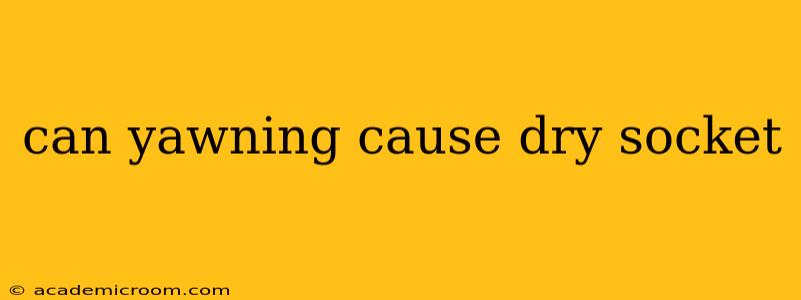Can Yawning Cause Dry Socket? Understanding the Link Between Yawning and Post-Extraction Complications
The short answer is: no, yawning itself cannot directly cause dry socket. However, the act of yawning and the subsequent pressure changes in the mouth can potentially exacerbate existing conditions or increase the risk of developing dry socket after a tooth extraction. Let's explore this further.
What is Dry Socket?
Dry socket, or alveolar osteitis, is a painful complication that can occur after a tooth extraction. It happens when the blood clot that normally forms in the extraction site becomes dislodged or dissolves prematurely. This exposes the underlying bone and nerve endings, leading to intense pain, bad breath, and sometimes a noticeable empty socket.
How Yawning Relates to Dry Socket Risk
While yawning won't cause dry socket, the forceful opening and closing of the jaw involved can put pressure on the extraction site. This pressure could potentially dislodge a precariously formed blood clot, increasing the risk of dry socket, especially if the clot is already weak or compromised.
What Increases the Risk of Dry Socket?
Several factors can significantly increase your chances of developing dry socket, and these are far more impactful than the simple act of yawning:
- Smoking: Smoking significantly reduces blood flow to the extraction site, hindering clot formation and increasing the risk of dry socket.
- Poor Oral Hygiene: Inadequate oral hygiene can introduce bacteria to the extraction site, interfering with healing and potentially leading to infection and dry socket.
- Certain Medications: Some medications, particularly those that affect blood clotting, can increase the risk.
- Difficult Extractions: Extractions that require significant bone removal or tissue manipulation are more prone to complications like dry socket.
- Hormonal Changes: Women who are menstruating or taking birth control pills may be at slightly increased risk.
- History of Dry Socket: If you've experienced dry socket before, you're more likely to experience it again.
Can I prevent dry socket?
Absolutely! Following your dentist's post-operative instructions meticulously is crucial. This includes:
- Avoiding smoking: This is one of the most significant preventative measures.
- Maintaining excellent oral hygiene: Gentle rinsing with a prescribed mouthwash and avoiding vigorous rinsing or spitting.
- Eating soft foods: Avoid anything that requires excessive chewing in the first few days.
- Avoiding strenuous activity: This minimizes pressure changes in the mouth.
- Taking prescribed pain medication: This helps manage pain and inflammation.
- Following up with your dentist: This ensures proper healing and allows for early detection of any complications.
So, should I avoid yawning after a tooth extraction?
While you shouldn't actively try to suppress yawning (it's a natural reflex), be mindful of it. Gentle yawning is usually fine. However, if you experience any significant pain during or after a yawn, contact your dentist immediately. Focusing on preventing dry socket through the strategies mentioned above is far more effective than trying to avoid yawning.
What are the symptoms of dry socket?
Symptoms of dry socket often develop 2-3 days after the extraction and include:
- Severe, throbbing pain: This is often localized to the extraction site but can radiate.
- Bad breath: The exposed bone can lead to a foul odor.
- Delayed healing: The extraction site may appear unusually empty and may not be healing as expected.
In summary, although yawning may slightly increase the risk of exacerbating an existing problem or contributing to a problem with a weak blood clot, it's not a direct cause of dry socket. Focusing on preventative measures and seeking immediate professional help if you suspect dry socket is far more important.
